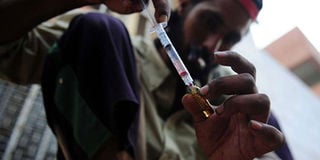Change attitude towards addicts if we are to help them out

A heroin user. Recovering drug addicts must cope with stigmatisation. PHOTO | ASIF HASSAN | AFP
What you need to know:
- And one of the strategies that is gaining traction in a bid to address this group in the fight against HIV infection is the Harm Reduction concept.
- The Nacada, in partnership with civil society organisations, has generated a directory on drug user organisations which was launched early this year.
For decades now, the world has witnessed widespread challenges associated with HIV infection, with developing nations and Sub-Saharan Africa the most affected.
The socio-economic burden it occasioned made HIV infection and efforts to conquer it a top priority for the nations.
And for a good reason. In countries with high HIV infection rates, poverty and death have taken centre stage, depleting family resources and occasioning decreased life expectancy among the workforce, with the resultant low economic growth.
As countries’ strategies to lower HIV infections continue, there has been an overt move to bring on board sections of the populations who are key stakeholders in this campaign.
In this category are people who use drugs, and among whom risks of exposure to HIV, Hepatitis B and C, tuberculosis and premature death due to drug overdose remain high.
STIGMA
The worst hit in this category are addicts who inject the drugs. And because of the stigma associated with drug addiction, this group has been shunned and policies touching on them are skewed.
And one of the strategies that is gaining traction in a bid to address this group in the fight against HIV infection is the Harm Reduction concept.
The strategy aims at reducing the negative perceptions associated with drug addiction and seeks to advance the rights of the addicts.
It helps victims break the addiction through use of methadone, as a prescribed opioid, and giving them access to healthcare.
But whereas developed countries have fully embraced, funded and implemented it, Africa is lagging behind.
In East Africa, Harm Reduction strategy has largely remained disjointed, with no policies in place, and no standards set to guide establishment and scale-up of the programme.
INTERVENTIONS
However, all is not lost. In the past three years, through the Global Fund grant, policymakers have been engaged in capacity building and drug policy dialogue forums, and creating awareness through its “Support, Don’t Punish” campaign.
In Zanzibar, the Commission for Narcotics and Drug Control supports recovering drug users to acquire identification document like passports and birth certificates for themselves and family members.
They are also assisted to secure employment through reference letters to relevant authorities and potential employers.
Zanzibar is in the process of signing one of the most comprehensive drug policies in East Africa. If passed, the country will be the first of its kind to include human rights principles in drug policy document.
STATE SUPPORT
In Burundi, policymakers have supported registration of a drug user network in Bujumbura city. Bujumbura hosts refugees from the neighbouring DR Congo, which has seen an increase in numbers of people using cocaine and injecting heroin.
Here at home, the National Authority for the Campaign Against Alcohol and Drug Abuse (Nacada), in partnership with civil society organisations, has generated a directory on drug user organisations which was launched early this year.
The initiative has received robust support from Health Cabinet Secretary Sicily Kariuki who, when opening a Harm Reduction conference in Nairobi in February, declared herself a Harm Reduction champion.
FUNDING
In East Africa, 90 percent of Harm Reduction implementation relies on donor funds.
Some 80 percent of this comes from Global Fund grants while others come from implementing partners like Medicines Du Monde, Centre for Disease Control and Prevention, Open Societies Foundation and others.
As the world prepares for the annual Commission on Narcotic Drugs meeting to be held in Geneva in April next year to discuss drug policies around the globe, East African countries have an opportunity to position themselves to benefit from this positive shift in attitude among policymakers.
Ms Bernice Apondi is a consultant on drug policy in East Africa.




